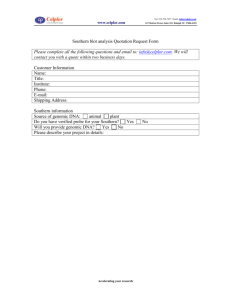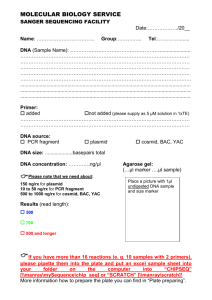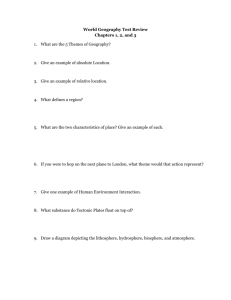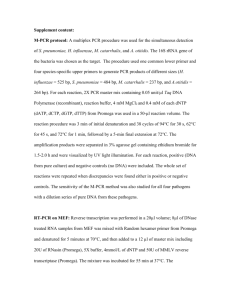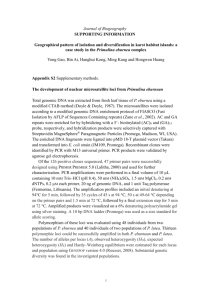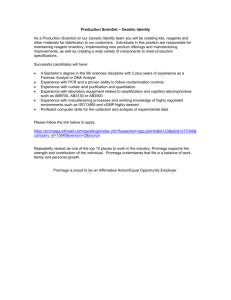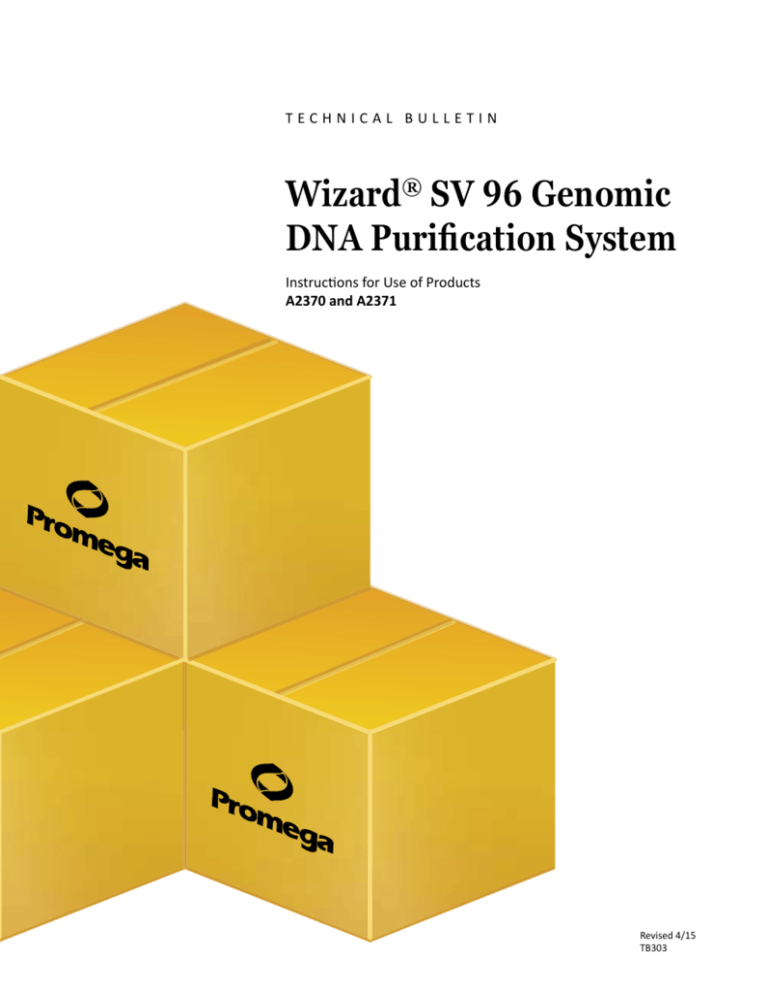
TECHNICAL BULLETIN
Wizard® SV 96 Genomic
DNA Purification System
Instructions for Use of Products
A2370 and A2371
Revised 4/15
TB303
Wizard® SV 96 Genomic DNA
Purification System
All technical literature is available at: www.promega.com/protocols/
Visit the web site to verify that you are using the most current version of this Technical Bulletin.
E-mail Promega Technical Services if you have questions on use of this system: techserv@promega.com
1. Description.......................................................................................................................................... 1
2. Product Components and Storage Conditions......................................................................................... 4
3. Isolation of Genomic DNA from Mouse Tail Clippings and Animal Tissues................................................ 5
3.A. Preparation of Solutions.............................................................................................................. 5
3.B. Preparation of Mouse Tail and Tissue Lysates................................................................................ 6
3.C. Purification of Genomic DNA from Prepared Tissue Lysates............................................................ 6
4. Isolation of Genomic DNA From Tissue Culture Cells.............................................................................. 8
4.A. Preparation of Solutions.............................................................................................................. 8
4.B. Purification of Genomic DNA from Tissue Culture Cells.................................................................. 8
5. Troubleshooting................................................................................................................................ 10
6. Related Products................................................................................................................................ 12
7. Summary of Changes.......................................................................................................................... 13
1.Description
The Wizard® SV 96 Genomic DNA Purification System provides a high-throughput 96-well format for fast, simple
preparation of intact, purified genomic DNA from different sample types, including mouse tail clippings, animal tissue
and tissue culture cells. The technique allows automation on liquid-handling workstations. Purification of genomic
DNA from 96 samples takes less than one hour and is achieved without centrifugation or precipitation. The isolated
genomic DNA is high-quality and serves as an excellent template for agarose gel analysis, restriction enzyme digestion
and PCR. Typical yields from various tissue sources are shown in Table 1.
The Wizard® SV 96 Genomic DNA Purification System requires the use of the Vac-Man® 96 Vacuum Manifold or
similar 96-well manifold for manual DNA purification. For genomic DNA purification on automated liquid-handling
workstations, vacuum manifolds specific to the workstation may be required. Genomic DNA is purified from lysates
using 96-well vacuum filtration. Washing the bound DNA does not require disassembly of the manifold, and filtrate
waste products are delivered directly to a vacuum trap, eliminating the need to empty waste collection vessels during
DNA purification. Genomic DNA is collected by elution into a 96-Well Deep Well Plate.
Promega Corporation · 2800 Woods Hollow Road · Madison, WI 53711-5399 USA · Toll Free in USA 800-356-9526 · 608-274-4330 · Fax 608-277-2516
www.promega.com TB303 · Revised 4/15
1
1.
Description (continued)
Table 1. Genomic DNA Yield From Various Tissues.
Sample
Amount
Average Yield
Tail Clipping
20mg
20µg
Liver
20mg
15µg
Heart
20mg
10µg
Brain
20mg
6µg
CHO cells
1 × 10 cells
5µg
NIH3T3 cells
1 × 10 cells
9µg
293 cells
1 × 10 cells
8µg
6
6
6
Add sample
lysate.
Bind DNA.
Wash.
Elute genomic
DNA.
3637MA02_2A
Highly pure
genomic DNA.
Figure 1. Genomic DNA isolation and purification using the Wizard® SV 96 Genomic DNA Purification
System.
2
Promega Corporation · 2800 Woods Hollow Road · Madison, WI 53711-5399 USA · Toll Free in USA 800-356-9526 · 608-274-4330 · Fax 608-277-2516
TB303 · Revised 4/15
www.promega.com
A. Genomic DNA Binding Apparatus
Binding Plate
Manifold Base
Vacuum Port
with Insert
in place
B. Washing Apparatus
Binding Plate
Manifold Base
C. Elution Apparatus
Binding Plate
Manifold Collar
Manifold Bed
2626MB03_2A
Elution Plate
Figure 2. The Vac-Man® 96 Vacuum Manifold (Cat.# A2291) with the Wizard® SV 96 Genomic DNA
Purification System. Panels A, B and C show the manifold and plate combinations necessary to accomplish
genomic DNA binding, washing and elution, respectively, for manual genomic DNA purification. For genomic DNA
purification on automated liquid handlers, vacuum manifold equipment specific for the workstation may be required.
!
Please note that an appropriate liquid trap should be placed between the Vacuum Manifold and your
vacuum pump. An instructional video on how to set up a Vac-Man® 96 Vacuum Manifold is available at:
www.promega.com/vacman96/
Promega Corporation · 2800 Woods Hollow Road · Madison, WI 53711-5399 USA · Toll Free in USA 800-356-9526 · 608-274-4330 · Fax 608-277-2516
www.promega.com TB303 · Revised 4/15
3
2.
Product Components and Storage Conditions
PRODUCT
Wizard® SV 96 Genomic DNA Purification System
S I Z E C A T. #
1 × 96 preps
A2370
Includes:
•
1 Binding Plate
•
1 96-Well Deep Well Plate
•
50ml Nuclei Lysis Solution
•
30ml 0.5M EDTA (pH 8.0)
• 50mlWizard® SV Lysis Buffer
•
185ml Column Wash Solution (CWA; concentrated)
•
1ml RNase A Solution, 4mg/ml
•
150ml Nuclease-Free Water
PRODUCT
Wizard® SV 96 Genomic DNA Purification System
S I Z E C A T. #
4 × 96 preps
A2371
Includes:
•
4
•
4
• 2 × 50ml
•
30ml
• 3 × 50ml
•2 × 370ml
• 3 × 1ml
•2 ×150ml
Binding Plates
96-Well Deep Well Plates
Nuclei Lysis Solution
0.5M EDTA (pH 8.0)
Wizard® SV Lysis Buffer
Column Wash Solution (CWA; concentrated)
RNase A Solution, 4mg/ml
Nuclease-Free Water
Storage Conditions: Store all Wizard® SV 96 Genomic DNA Purification System components at 22–25°C. See
system label for expiration date.
Note: If purifying genomic DNA from tissue samples, such as mouse tails, proteinase K must be purchased
separately. For one plate (96 samples), 40mg of proteinase K will be required (Cat.# V3021, 100mg).
4
Promega Corporation · 2800 Woods Hollow Road · Madison, WI 53711-5399 USA · Toll Free in USA 800-356-9526 · 608-274-4330 · Fax 608-277-2516
TB303 · Revised 4/15
www.promega.com
3.
Isolation of Genomic DNA from Mouse Tail Clippings and Animal Tissues
Materials to Be Supplied by the User
•
Proteinase K (20mg/ml solution in nuclease-free water) (Cat.# V3021 or Sigma Cat.# P2308).
Proteinase K must be qualified nuclease-free.
•Vac-Man® 96 Vacuum Manifold (Cat.# A2291)
•
•
•
•
•
•
•
55°C water bath
vacuum trap for waste collection (e.g., Fisher Cat.# 10-182-50B, 1L size)
vacuum pump capable of 15–20 inches of Hg (e.g., Fisher Cat.# 01-092-29)
vacuum tubing
single or multichannel pipettors capable of dispensing 10–1,000µl
adhesive plate sealers (foil)
96-well deep well plate for proteinase K digestion
3.A. Preparation of Solutions
Prepare the following solutions prior to beginning the Wizard® SV 96 Genomic DNA Purification System protocol:
Proteinase K Solution: Resuspend proteinase K with Nuclease-Free Water to a concentration of 20mg/ml working
solution. Dispense the proteinase K into working volumes determined by the average number of preps done at a time.
Store proteinase K solution at –20°C and thaw on ice. Avoid multiple freeze-thaw cycles of the proteinase K solution,
as this will result in decreased activity.
Column Wash Solution (CWA): Add 95% ethanol to the Column Wash Solution (CWA) bottle as directed on the
bottle label. Label the bottle to indicate that ethanol has been added. Seal well and store at room temperature.
Digestion Solution Master Mix: For every tissue sample, combine the following reagents in a tube and store on ice
until use:
Volume
per Sample
Total Volume
for 96 Samples
Nuclei Lysis Solution
200µl
22.0ml
0.5M EDTA (pH 8.0)
50µl
5.5ml
proteinase K, 20mg/ml
20µl
2.2ml
RNase A Solution, 4mg/ml
5µl
550µl
275µl
30.25ml
Digestion Solution Master Mix
Total Volume
Promega Corporation · 2800 Woods Hollow Road · Madison, WI 53711-5399 USA · Toll Free in USA 800-356-9526 · 608-274-4330 · Fax 608-277-2516
www.promega.com TB303 · Revised 4/15
5
3.B. Preparation of Mouse Tail and Tissue Lysates
1.
Use a 0.5–1.2cm mouse tail clipping from the tip of the tail or up to 20mg of other tissue sample. A 1.2cm
mouse tail clipping usually weighs approximately 20mg. Cut the 20mg mouse tail clipping or tissue sample
into two equally sized pieces and place the pieces into a 96-well, deep well plate (provided by the user).
!
Note: Tissue mass cannot exceed the recommended amount, or the column will clog. Mouse tail clippings
must be from the terminal 2cm of the mouse tail. Samples further from the tip of the tail will contain excess
cartilagenous material that will clog the minicolumn.
2.
Add 275µl of the prepared Digestion Solution Master Mix to each sample in the 96-well deep well plate. If the
mouse tail clipping or tissue sample is not covered by the Digestion Solution Master Mix, cut the tissue into
smaller pieces. Be sure that the sample is completely covered with Digestion Solution Master Mix. Cover the
plate with an adhesive seal (provided by the user).
3.
Place the plate in a 55°C water bath and incubate overnight (16–18 hours). Be sure that the water in the
incubator does not cover the sample plate. It is not necessary to shake the plate during the incubation.
Optional: If there is undigested hair and cartilage after the overnight proteinase K digestion, spin the plate in
a centrifuge at 2,000 × g to pellet any undigested sample. Transfer the supernatant to a new 96-well, deep well
plate (provided by the user). Proceed with addition of the Wizard® SV Lysis Solution.
3.C. Purification of Genomic DNA from Prepared Tissue Lysates
1.
Following overnight incubation at 55°C, remove the seal and dispense 250µl of the Wizard® SV Lysis Buffer into
each well of the deep-well plate containing lysate. Note: Lysate must be warm during processing.
2.
Mix the contents of each well by pipetting several times. Process the lysates as soon as possible after the
Wizard® SV Lysis Buffer has been added (lysate must still be warm). If lysates cannot be processed immediately,
the sample lysate plate may be frozen at –70°C. However, the lysates need to be warmed to 55°C for one hour
before they are processed.
3.
Prepare the Vacuum Manifold as shown in Figure 2. Place the Binding Plate in the Vacuum Manifold Base.
Orient the Binding Plate in the Vacuum Manifold with the numerical column headers toward the vacuum port.
Attach the vacuum line to the vacuum port on the Manifold Base.
4.
Transfer the tissue lysates to the wells of the Binding Plate. Apply vacuum until all of the lysate has passed
through the Binding Plate.
Note: Vacuum pressure should be >15 inches of mercury for efficient processing. Some wells of the Binding
Plate may empty more quickly than other wells. To maintain strong vacuum through the wells, cover the empty
wells to reduce vacuum leak.
5.
Verify that ethanol has been added to the Column Wash Solution (CWA).
6.
Add 1ml of Column Wash Solution (CWA) to each well of the Binding Plate.
7.
Apply vacuum until the Column Wash Solution (CWA) passes through the Binding Plate.
8.
Repeat Steps 6 and 7 two more times for a total of 3 washes with the Column Wash Solution (CWA).
6
Promega Corporation · 2800 Woods Hollow Road · Madison, WI 53711-5399 USA · Toll Free in USA 800-356-9526 · 608-274-4330 · Fax 608-277-2516
TB303 · Revised 4/15
www.promega.com
9.
After the wells have emptied, continue to apply vacuum for an additional 6 minutes to allow the binding matrix
to dry.
10. Turn off the vacuum. Release the vacuum line from the Manifold Base, and snap it into the vacuum port in the
Vacuum Manifold Collar. Remove the Binding Plate from the Manifold Base. Blot by gently tapping onto a clean
paper towel to remove residual ethanol; repeat if necessary to remove all residual ethanol.
11. Place the 96-Well Deep Well Plate in the Manifold Bed, and position the Vacuum Manifold Collar on top. Orient
the plate with the numerical column headers toward the vacuum port.
12. Position the Binding Plate on top of the Manifold Collar. Place the Manifold Collar containing the Binding Plate
on top of the 96-Well Deep Well Plate sitting on the manifold bed as shown in Figure 2. The Binding Plate tips
must be centered on the Deep Well Plate wells, and both plates must be in the same orientation.
13. Add 250µl of room-temperature Nuclease-Free Water to each well of the Binding Plate and incubate for
2 minutes at room temperature.
Optional: To improve DNA yield, heat the water to 65°C before adding it to the column for elution.
14. Apply vacuum until the Nuclease-Free Water passes through the Binding Plate.
15. Repeat Steps 13 and 14 for a total elution volume of 500µl.
Note: Elution volumes of 500µl are recommended for optimal DNA yield from tissue samples. Elution volumes
less than 500µl will concentrate the DNA but will decrease the total DNA yield.
16. Release the vacuum, and remove the Wizard® SV 96 Binding Plate. Carefully remove the Manifold Collar,
making sure that the Deep Well Plate remains positioned in the Manifold Bed. If droplets are present on the top
of the wells of the plate, gently tap the plate on the bench top until the droplets fall to the bottom of the plate.
Eluate volumes may vary but are generally 440–450µl. Samples can be stored at –20°C or –70°C by covering the
plate tightly with a plate sealer.
Promega Corporation · 2800 Woods Hollow Road · Madison, WI 53711-5399 USA · Toll Free in USA 800-356-9526 · 608-274-4330 · Fax 608-277-2516
www.promega.com TB303 · Revised 4/15
7
4.
Isolation of Genomic DNA From Tissue Culture Cells
Materials To Be Supplied By The User
•
1X phosphate-buffered saline (PBS), sterile (for cultured cells)
4.A. Preparation of Solutions
Prepare the following solution prior to beginning the Wizard® SV 96 Genomic DNA Purification System protocol for
tissue culture cells:
Column Wash Solution (CWA): Add 95% ethanol to the Column Wash Solution (CWA) bottle as directed on the
bottle label. Label the bottle to indicate that ethanol has been added. Seal well and store at room temperature.
4.B. Purification of Genomic DNA from Tissue Culture Cells
Use the following protocol for lysis of cultured cells grown in a 96-well tissue culture plate. Use at least 1 × 104 cells to
a maximum of 5 × 106 cells per purification. The number of cells may need to be adjusted depending on cell type and
function.
1.
Wash the cells once with sterile 1X PBS.
2.
Add 150µl of Wizard® SV Lysis Buffer to the washed cells. Mix by pipetting.
3.
Freeze cell lysates at –70°C if they are not going to be processed immediately.
4.
Prepare the vacuum manifold as shown in Figure 2. Place the Binding Plate in the vacuum manifold base. Orient
the Binding Plate in the vacuum manifold with the numerical column headers toward the vacuum port. Attach the
vacuum line to the vacuum port on the Manifold Base.
5.
Transfer the cell lysates to the wells of the Binding Plate. Apply vacuum until the lysates have all passed through
the Binding Plate.
6.
Verify that ethanol has been added to the Column Wash Solution (CWA). Add 1ml of Wash Solution to each well
of the Binding Plate. Apply vacuum until the Wash Solution passes through the Binding Plate.
7.
Repeat Step 6 two more times for a total of 3 washes with the Column Wash Solution (CWA).
8.
After the wells have emptied, continue to apply vacuum for an additional 6 minutes to dry the binding matrix.
9.
Turn off the vacuum. Release the vacuum line from the Manifold Base, and snap it into the vacuum port in the
Vacuum Manifold Collar. Remove the Binding Plate from the Manifold Base. Blot by gently tapping onto a clean
paper towel to remove residual ethanol; repeat if necessary to remove all residual ethanol.
Note: RNA may be copurified with genomic DNA. To remove copurified RNA, add 2µl of RNase A Solution per
250µl of Nuclease-Free Water prior to elution of DNA from the column. Once eluted, incubate purified DNA
at room temperature for 10 minutes. Alternatively, add the RNase A Solution (2µl) following elution from the
Wizard® SV 96 Binding Plate.
10. Place the 96-Well Deep Well Plate in the Manifold Bed, and position the Vacuum Manifold Collar on top. Orient
the plate with the numerical column headers toward the vacuum port.
8
Promega Corporation · 2800 Woods Hollow Road · Madison, WI 53711-5399 USA · Toll Free in USA 800-356-9526 · 608-274-4330 · Fax 608-277-2516
TB303 · Revised 4/15
www.promega.com
11. Position the Binding Plate on top of the Manifold Collar. Place the manifold collar containing the Binding Plate
on top of the Deep Well Plate sitting on the manifold bed as shown in Figure 2. The Binding Plate tips must be
centered on the deep well elution plate and both plates must be in the same orientation.
12. Add 250µl of room temperature Nuclease-Free Water to each well of the Binding Plate and incubate for
2 minutes at room temperature.
Note: An elution volume of 250µl is recommended for optimal yield from tissue culture cell samples. Elution in
volumes less than 250µl will concentrate the DNA but will decrease the total DNA yield. Elution volumes greater
than 250µl will not significantly improve yield.
Optional: To improve DNA yield, heat the water to 65°C before adding it to the column for elution.
13. Apply a vacuum for 1 minute.
14. Release the vacuum, and remove the Binding Plate. Carefully remove the manifold collar, making sure that the
Deep Well Plate remains positioned in the Manifold Bed. If droplets are present on the top of the wells of the
plate, gently tap the plate on the bench top until the droplets fall to the bottom of the plate. Eluate volumes may
vary but are generally 225µl. Samples can be stored at –20°C or –70°C by covering the plate tightly with a plate
sealer.
Promega Corporation · 2800 Woods Hollow Road · Madison, WI 53711-5399 USA · Toll Free in USA 800-356-9526 · 608-274-4330 · Fax 608-277-2516
www.promega.com TB303 · Revised 4/15
9
5.Troubleshooting
For questions not addressed here, please contact your local Promega Branch Office or Distributor. Contact information
available at: www.promega.com. E-mail: techserv@promega.com
Symptoms
Causes and Comments
Low A260 (low DNA yield)Tissue lysate stored at –20°C or –70°C. Lysate that has been
frozen may have a decreased amount of genomic DNA. For
optimal performance, purify the DNA as soon as the lysate is
prepared.
Tissues have undergone multiple freeze-thaw cycles. Samples
that have been frozen and thawed repeatedly may eventually
experience DNA degradation. Use fresh tissue samples whenever
possible.
Tissue culture cells are low in genomic DNA. Yield of genomic
DNA may vary depending on the number of cells used for the
isolation. If genomic DNA yields are low, increase the amount of
starting material processed to a maximum of 5 × 106 tissue
culture cells.
Wizard® SV Lysis Buffer not added to the tissue lysates or
washed cells. Make sure the Wizard® SV Lysis Buffer is added to
all samples.
Sample lysates have been frozen but not thawed and warmed to
55°C. Process tissue lysates as soon as they are removed from
55°C incubation. If samples have cooled, place the lysates back
at 55°C for 60 minutes and continue the purification.
Steps not followed correctly or wrong reagents used. The
Wizard® SV 96 Genomic DNA Purification System is a multistep
process that requires that the correct reagents are used in the
correct order. This ensures that the DNA remains bound to the
membrane during purification. The Wizard® Plus SV DNA
Purification System buffers are not compatible with this system
and should not be used.
Ethanol not added to the Column Wash Solution (CWA).
Prepare the solutions as instructed in Sections 3.A and 4.A
before beginning the procedure.
10
Promega Corporation · 2800 Woods Hollow Road · Madison, WI 53711-5399 USA · Toll Free in USA 800-356-9526 · 608-274-4330 · Fax 608-277-2516
TB303 · Revised 4/15
www.promega.com
Symptoms
Causes and Comments
RNA contaminationRNase A was not added to the tissue lysate digestion solution.
Add 2µl of RNase A solution to the final eluate and incubate at
room temperature for at least 10 minutes.
RNA was copurified with genomic DNA from tissue culture cells.
Add 2µl of RNase A Solution to final eluate and incubate at room
temperature for at least 10 minutes.
Clogged Wizard® SV 96 Binding PlateLysate too concentrated or too viscous to pipet easily. If the
lysate is too viscous, dilute with Wizard® SV Lysis Buffer until it
becomes easy to pipet. Then apply the entire lysate to a well of
the Wizard® SV 96 Binding Plate.
Too much tissue sample used in the lysate preparation. A
maximum of 20mg of mouse tail or animal tissue can be used
for lysate preparation.
Too many cells processed. A maximum of 5 × 106 cells can be
processed per column of the Wizard® SV 96 Binding Plate.
Tissue lysate becomes too viscous when allowed to cool. Process
tissue lysates as soon as they are removed from 55°C incubation.
If samples have cooled, place the lysates back in the 55°C
incubator for 60 minutes and continue with the purification.
Proteinase K-treated mouse tail clippings contain a lot of
undigested hair or cartilage. Mouse tail clippings must be
collected from within the terminal 2cm of the tail tip. Clippings
collected further from the tip will contain cartilaginous tissue
that will clog the column.
Mouse tail hair and cartilage are not easily digested by
proteinase K. After proteinase K digestion centrifuge the
sample at 2,000 × g to pellet undigested sample. Transfer the
supernatant to a new 96-well, deep well plate and proceed with
the protocol.
Promega Corporation · 2800 Woods Hollow Road · Madison, WI 53711-5399 USA · Toll Free in USA 800-356-9526 · 608-274-4330 · Fax 608-277-2516
www.promega.com TB303 · Revised 4/15
11
5.
Troubleshooting (continued)
Symptoms
Causes and Comments
Incomplete digestion of tissue samplesMake sure Proteinase K was added to the Digestion Solution
Master Mix.
Too much tissue sample used in the lysate preparation. A
maximum of 20mg of mouse tail or animal tissue can be used
for lysate preparation.
Multiple freeze-thaw cycles of proteinase K.Multiple freezethaw cycles reduce the activity of proteinase K. Begin with a new
proteinase K solution.
Vacuum steps are slowLysate too concentrated. If the lysate is difficult to pipette easily,
the vacuum step to pass lysate through the Wizard® SV 96
Binding Plate may be slow.
Vacuum pressure insufficient. A vacuum pressure >15 inches of
mercury is required to use the Wizard® SV 96 Binding Plate.
6.
Related Products
Please visit our online catalog at www.promega.com for a complete listing of our newest DNA Purification and
Amplification products.
Product
Wizard® SV Genomic DNA Purification System
SizeCat.#
50 preps
A2360
250 preps
A2361
Wizard® Genomic DNA Purification Kit
100 isolations × 300µl
A1120
500 isolations × 300µl
A1125
100 isolations × 10ml
A1620
Proteinase K
100mg
V3021
10 reactions
M7501
100 reactions
M7502
1,000 reactions
M7505
200µl
C1141
PCR Master Mix
PCR Nucleotide Mix
12
1,000µlC1145
Promega Corporation · 2800 Woods Hollow Road · Madison, WI 53711-5399 USA · Toll Free in USA 800-356-9526 · 608-274-4330 · Fax 608-277-2516
TB303 · Revised 4/15
www.promega.com
7.
Summary of Changes
The following changes were made to the 4/15 revision of this document:
1.
Added a note containing a link to an instructional video for setting up the vacuum manifold (Section 1 following
Figure 2).
2.
The document design was updated.
© 2002, 2005, 2009, 2012, 2015 Promega Corporation. All Rights Reserved.
Vac-Man and Wizard are registered trademarks of Promega Corporation.
Products may be covered by pending or issued patents or may have certain limitations. Please visit our Web site for more information.
All prices and specifications are subject to change without prior notice.
Product claims are subject to change. Please contact Promega Technical Services or access the Promega online catalog for the most up-to-date
information on Promega products.
Promega Corporation · 2800 Woods Hollow Road · Madison, WI 53711-5399 USA · Toll Free in USA 800-356-9526 · 608-274-4330 · Fax 608-277-2516
www.promega.com TB303 · Revised 4/15
13

